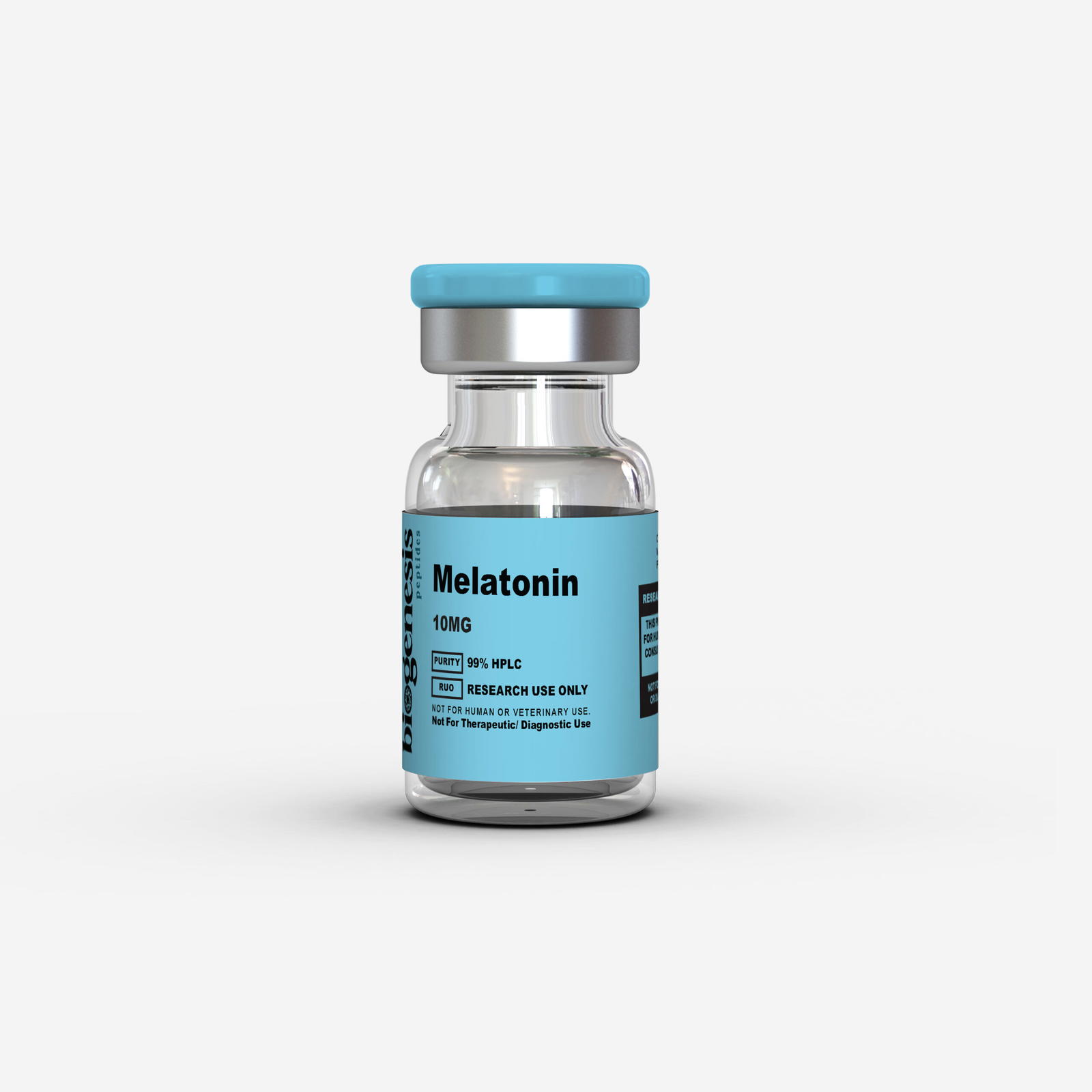Product Usage
THIS PRODUCT IS INTENDED AS A RESEARCH CHEMICAL ONLY. This designation allows the use of research chemicals strictly for in vitro testing and laboratory experimentation only. All product information available on this website is for educational purposes only. Bodily introduction of any kind into humans or animals is strictly forbidden by law. This product should only be handled by licensed, qualified professionals. This product is not a drug, food, or cosmetic and may not be misbranded, misused, or mislabeled as a drug, food, or cosmetic.
Melatonin 10mg
Melatonin is a naturally occurring indoleamine primarily produced by the pineal gland, playing a crucial role in regulating circadian rhythms, sleep-wake cycles, and neuroendocrine functions. It is widely studied for its potential impact on sleep regulation, oxidative stress management, and immune system modulation.
$0.00
Peptides will arrive in a lyophilized (powder) form for maximum stability
Out of stock
Buy 5 for 5% off
Buy 10 for 10% off
Buy 15 for 15% off
OVERVIEW
Melatonin is a naturally occurring indoleamine primarily produced by the pineal gland, playing a crucial role in regulating circadian rhythms, sleep-wake cycles, and neuroendocrine functions. It is widely studied for its potential impact on sleep regulation, oxidative stress management, and immune system modulation. Research suggests that melatonin may:
- Regulate sleep patterns by influencing the body’s internal clock
- Act as a potent antioxidant, reducing oxidative damage at the cellular level
- Support immune function and inflammatory response regulation
- Influence metabolic and neuroprotective processes
- Play a role in reproductive hormone modulation
Melatonin functions by binding to melatonin receptors (MT1 and MT2), which are distributed in the brain and peripheral tissues, helping synchronize biological processes to environmental light-dark cycles.
RESEARCH
Melatonin and Sleep Regulation
Melatonin is most well-known for its role in controlling the circadian rhythm and sleep-wake cycles. Research findings indicate:
- It signals the body when it is time to sleep, aiding in sleep onset and quality.
- MT1 and MT2 receptor activation influences the sleep phase and duration.
- Studies suggest that melatonin may improve sleep patterns in circadian rhythm disorders.
Melatonin as an Antioxidant
Melatonin is a powerful antioxidant with the ability to neutralize free radicals and protect cells from oxidative damage. Key research findings include:
- It enhances the activity of other antioxidants, such as glutathione and superoxide dismutase (SOD).
- Melatonin can cross the blood-brain barrier, offering neuroprotective benefits.
- Studies suggest its role in reducing age-related oxidative stress and cellular damage.
Melatonin and Immune Function
Melatonin has been studied for its immunomodulatory properties, with research suggesting:
- It enhances immune cell function and supports the body’s defense mechanisms.
- Melatonin may play a role in regulating inflammatory cytokine production.
- Potential benefits in reducing inflammation-associated conditions have been explored.
Melatonin and Metabolism
Melatonin has been implicated in metabolic regulation, with research indicating:
- It may influence insulin sensitivity and glucose homeostasis.
- Studies have explored its role in obesity and metabolic disorders.
- Its effects on energy expenditure and fat oxidation are areas of active research.
Melatonin and Neuroprotection
Melatonin has been investigated for its potential role in cognitive health and neuroprotection. Research highlights:
- It may help protect neurons from oxidative stress and mitochondrial dysfunction.
- Studies suggest a potential role in neurodegenerative disease models.
- Melatonin’s anti-inflammatory properties may contribute to brain health and cognitive function.
STRUCTURE
- Molecular Formula: C₁₃H₁₆N₂O₂
- Molecular Weight: 232.2783 g/mol
- CAS Registry Number: 73-31-4
- Purity: 99% HPLC
RESEARCH USE ONLY
Melatonin is strictly intended for research and laboratory purposes. It is not for human or veterinary use and is not intended for therapeutic or diagnostic applications.
All products on this site are for Research, Development use only. Products are Not for Human consumption of any kind.
The statements made within this website have not been evaluated by the US Food and Drug Administration. The statements and the products of this company are not intended to diagnose, treat, cure or prevent any disease.
Biogenesis Peptides is a chemical supplier. Biogenesis Peptides is not a compounding pharmacy or chemical compounding facility as defined under 503A of the Federal Food, Drug, and Cosmetic act. Biogenesis Peptides is not an outsourcing facility as defined under 503B of the Federal Food, Drug, and Cosmetic act.

